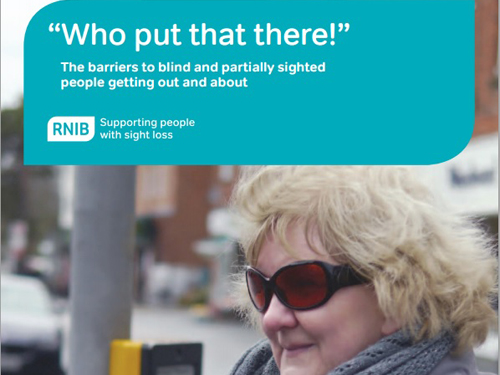
Last week, the Royal National Institute for the Blind launched a campaign to highlight and improve the safety of streets for blind and partially sighted people. RNIB Regional Campaigns Officer Michael Wilson, writes the following:
“It’s time to make our streets clutter free.
While I have worked at RNIB there has always been one campaign issue that has dominated our conversations with campaigners and decision makers. Streets.
In particular making streets clutter free and safe to navigate. Over the last few years with the rise of new ‘shared space’ developments, and crossings which are inaccessible, the demand from our campaigners to do something that would deliver change has grown louder and louder.
As a result we produced a report earlier this year to highlight evidence, and some of the challenges faced by blind and partially sighted people. We also set out three clear asks,
1) Review and strengthen national guidance
2) Implement a street charter at a local level with campaigners
3) Review the policies and procedures around the built environment in dialogue with blind and partially sighted people.
Out of the report was born the RNIB Street Charter Toolkit – a tool developed by, and for, blind and partially sighted people. Its aim? To help anyone work with their local authority and develop a Street Charter.
We knew asking all local authorities to implement a ‘one size fits all’ charter would not work. Instead, the toolkit allows local people to enter into a dialogue with their local council or authority and devise local solutions for local problems.
I know many of our campaigners feel a frustration that, despite various laws, our streets are still crammed with clutter. We will continue to push for national change (supporting national law on parking pavements, stronger Inclusive Mobility guidance, enforcement of the Equality Act and Public Sector Equality Duty) but this toolkit represents the best chance for people to make a change in their area.
However we need you to take action to help these improvements happen. Your story, your experiences, and your knowledge can have an extraordinary impact on local authorities.
RNIB and our network of campaigns staff are here to support you when attending council meetings, arranging blindfold walks, gathering evidence, and raising awareness in the local media. We’re here to suggest solutions that could work, and we’ll help support as many of you, nationally or locally, who believes a-boards should be banned, parking on pavements stopped, bins and recycling boxes cleared away, crossings kept, and an end to the dreaded no go zones that are known as ‘shared space’, as we can.
Together we can deliver change. Together we can stop blind and partially sighted people saying ‘Who put that there’.”
This campaign could be a valuable opportunity for local Liberal Democrat campaigners to reach out to another national campaigning organisation and work together on an issue of local concern.
RNIB Resources:
“Who Put That There!” street charter toolkit
“Who Put That There!” short campaign videos: Preston, Twickenham, Portsmouth